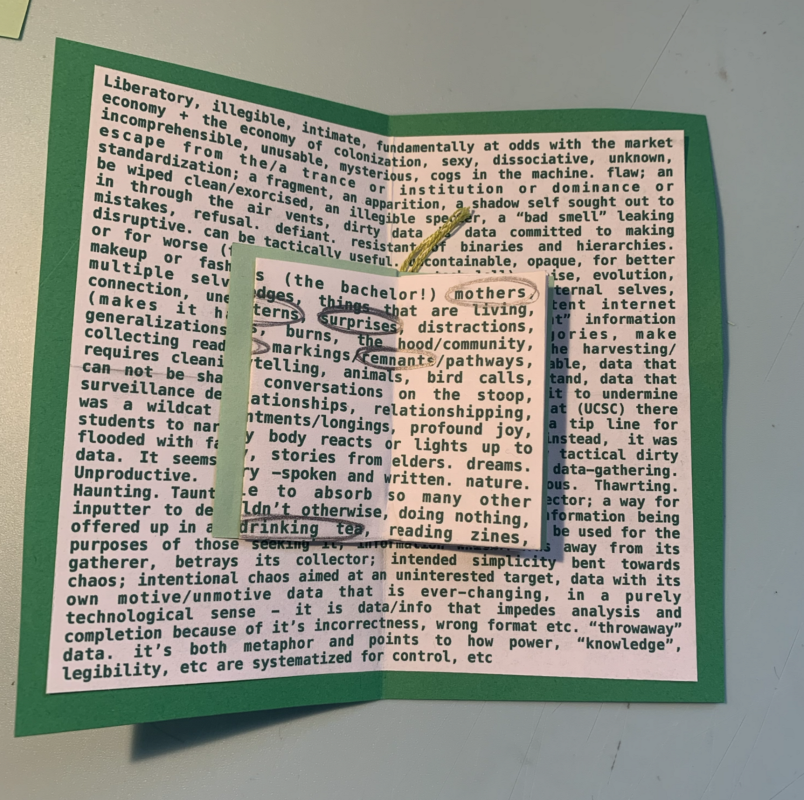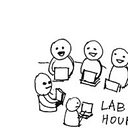Written by Kenlynn Albright, edited by Neta Bomani

Reading, Writing & Compiling is a workshop series stewarded by Neta Bomani and Kenlynn Albright for the School for Poetic Computation’s summer COCOON session. The series took place on Wednesdays and Fridays July through August and featured workshops by Jie Qi, Natalie Freed, Yuchen Chang, Gabrielle Octavia Rucker, Kameelah Janan Rasheed, and Neta Bomani which interrogated ways of reading, writing, compiling and learning with and without computers.
Reading, Writing & Compiling consisted of the following workshops:
- Storytelling with Paper Circuits by Jie Qi and Natalie Freed
- Paper System: Intro to Artists’ Books by Chang Yuchen
- Chicken Scratch Session: Intuitive Writing Through Asemic Practice by Gabrielle Octavia Rucker
- PLEASE DO NOT PERCEIVE ME: The Poetics of Dirty Data and Embedded Stellar Clusters by Kameelah Janan Rasheed
- Reading, Writing & Compiling Zines by Neta Bomani
For a list of participants check out: sfpc.io/cocoon/participants
Read a recap of each workshop below.
Storytelling with Paper Circuits
During our first workshop for Reading, Writing, and Compiling, Jie Qi led participants through storytelling with paper circuits. She explained the accessibility and familiarity of paper: “It’s soft, it’s affordable, it’s everywhere.” Exploring circuitry, light, and paper, putting three objects that we use to communicate in separate ways together, makes space for a new perspective. Flipping a light switch or triggering a circuit is something we do with little intention every day in different forms. Suddenly, this act is conscious and carries meaning. “Keep the soul. The soul is not the technology. The soul is the story:”
Later in class, Cezanne posed a question that got participants thinking about the possibilities of sensors and pressures: “I was thinking about how the different sensors create different human art interactions. And so my question is: if you could make any sensor to sense anything, what would it be?” Responses stumbled into the chat: Something that “senses edible plants?” or, “Maybe something that senses laughter?” The possibilities of paper circuits seemed endless.
Paper System: An Intro to Artist’s Books
I woke up thinking about our relationship to nature and reading. Many of my books are unbound and take the shape of leaves on the path to the creek by my childhood home. Growing up, there were natural systems we listened to. For example, there’s an edible mushroom I grew up picking in Indiana. My grandpa would tell me “When the oak leaves are the size of mouse ears, the mushrooms will start popping up through the late spring dirt.”
We listen to the leaves, that are listening to the mushrooms. We all read each other, exchanging pages, slipping notes and reminders everywhere. Creating our own symbiotic system. During her workshop, Yuchen read a line from a Chinese poem [by Xu Jun of the Qing Dynasty], “The wind doesn’t know words, [so] why is it flipping through books?” In response, Yuchen said “whatever this book is about, it is also a substance [that] contains some nutrition to some creatures.”
On Friday, we had a conversation about systems and randomness. The two are not mutually exclusive. With that, I also return to the overlap of simplicity and complexity in some artist books. Yuchen compared the compiling of some artist books to haikus. As the reader, you are given so few words, but at the same time, given the physical experience of the book. Your mind, personal contexts and histories are left to become the thread to bind it into an artifact that makes you feel.
Chicken Scratch Session
In our Chicken Scratch Session and journey through asemic writing, Gabrielle Octavia Rucker showed participants a diagram about “functional vs. nonfunctional pencil holding.” Differences in pencil grips and positions of fingers reminded me of the burden I felt as a left-handed kid. I worried about smudging ink when writing left to right, having to find a left handed desk on my first day of high school, and eight year old me in art class trying to find the lone pair of left handed scissors. These are some of the first memories I have of discomfort in uniformity and elimination of personal languages. Does “function” come down to how many people are able to interact or understand a piece of communication? Perhaps we can turn to a quote shared by Rucker from Peter Schwenger: “Asemic writing offers an implicit resistance.”
“Something that I think resistance looks like is re-establishing what language means to us… I’ve always thought this is an evolving tool that we have,” says Rucker in response to Schwenger. Breaking and unlearning limitations on our tools of communication is asemic practice.
Neta brought up a point about language that resonated with many in our workshop: “We’re constantly trapped in this crisis of articulation, that is to say that language is just an approximation of something.” To this point, Mon added, “sometimes I also feel like linguistic annihilation is an appropriate way to describe what is intended through systematic erasure of language. If the colonizer’s language propels linguistic determinism, then something is happening to the colonized.”
PLEASE DO NOT PERCEIVE ME
Our fourth workshop presented by Kameelah Janan Rasheed was “PLEASE DO NOT PERCEIVE ME,” an immediately relatable title. As we walked through the poetics of dirty data and embedded stellar clusters, the mention of Lucille Clifton’s “I am not done yet” (1974) stuck with me. Thinking of the “ongoingness and imminency” of a person, a book, or anything you may choose to read has no end date or limit. What do “life-cycles of a text” look like? How can things be read, re-read, and torn apart? During the workshop, Kameelah also brought to participants a passage from Fred Moten and Stefano Harvey’s All Incomplete, discussing what happens when a process is disrupted or when something that is not “already deject, reject, or just as well as dead” enters the system. Complicating these inputs, refusing “the grasp,” and creating with “a desire for aliveness” is a tactic to warp perception and limit surveillance.
Below are two zines showing our Zoom chats. In the dark green booklet, we answer the question: “How would you describe dirty data?” In the light green zine, we identify sources of learning.


Reading, writing & compiling zines


With Jie, we navigated circuits and circulation in the sense of literal light circuits, but also how circuits relate to the traveling of a zine from hand-to-hand. Yuchen engaged participants in understanding systems (and lack thereof), as well as bookbinding and improvisation in artist books. Gabrielle brought asemic writings and perspectives on intention, language, illegibility, communication, and abstraction. With Kameelah, we wandered through dirty data, perception, and reconstruction of what learning means.
In thinking about zine practice during Neta’s final workshop of the Reading, Writing, and Compiling series, the history of zine practice shows that zines are not neutral, nor passive. Zines are technologies. And all aesthetic objects — including technologies and codes — have ideologies embedded within them when we examine their history and context. At the core of zine practice is a do-it-yourself ethos of expression, knowledge sharing, and publishing that signals the refusal of oppressive hegemonic systems.
Kameelah mentioned subversion of the idea of “something having to be passive in order to be digested by a system.” Neta’s shared zines made by herself and other zine makers which take forms that both blur the line between artist book and zine and thwart what you may think to read and challenge this idea of passive, dead, or nonfunctional text and creation. Zines made by Neta take many shapes: a tea bag (“Tea”), a wallet (“Don’t be a Bystander: 6 Tips for Responding to Racist Attacks”), a library note card (“Black Women Librarians”), a bookmark (“Knotted Bookmark”), a ring (“Black Feminist Ring”). Individually, they transform the way we read, write, interpret, compile, and learn, naturally incorporating themselves into the mundane details of an everyday existence.
Join the participants of Reading, Writing & Compiling Friday, September 10 at 7pm EST as they share their collectively compiled publication featuring an array of creative writing, book forms, and performative readings to encompass what they’ve learned over the course of their study.
The showcase will take place on Twitch and be archived on YouTube and feature contributions from the following participants:
Andrew Tan Tuck Ming
Ayana Zaire Cotton
Derek Lopez Vergara
Dia Flood
Elizabeth Ellis
Heena Sharma
Kenlynn Albright
Maria Thomas
Monica Mohapatra
Stephanie Wu
